Living Languages
The blog for the Institute of Modern Languages Research
Photography and the Languages of Reconstruction after the Second World War, 1944-49
‘Photography and the Languages of Reconstruction after the Second World War, 1944-49’ took place on 12 April 2019 at Cardiff University. The symposium was organised with the support of the Learned Society of Wales, the Institute of Modern Languages Research and Cardiff University’s School of Journalism, Media and Culture and School of Modern Languages.
The symposium explored transnational perspectives on photography of the Second World War and interrogated how photography challenged national and/or linguistic boundaries in representing the immediate post-war processes of reconstruction. The event highlighted three pathways that were used to explore the role of photography in post-war reconstruction: cultural encounters and humanitarian responses to war; borders and bodies; and deconstructing empire. Speakers explored topics ranging from the representation of displaced peoples camps in Allied-occupied Germany to picturing the Red Army’s demobilisation in Soviet Russia to the role of psychology and photography in the rehabilitation of orphans in post-war Britain. The symposium ended with a final session on the role of Europe’s archives in challenging East/West narratives of the immediate post-war period and a roundtable discussion on the practice and theory of photography and war with colleagues whose work straddled translation studies, memory studies and media studies. Speakers came from universities in the UK, Belgium and Australia, providing perspectives on the past and present of photography and war that were truly global.
The organisers would like to thank the Learned Society of Wales and the Institute of Modern Languages Research most warmly for their support for this event. We are planning a journal special issue to take forward the research collaborations initiated in the event. A pendent museum-based event with curators and archivists is planned for late 2019.

Claire Gorrara and Tom Albeson, Cardiff University
The library of poet and professor, Friedrich Gundolf
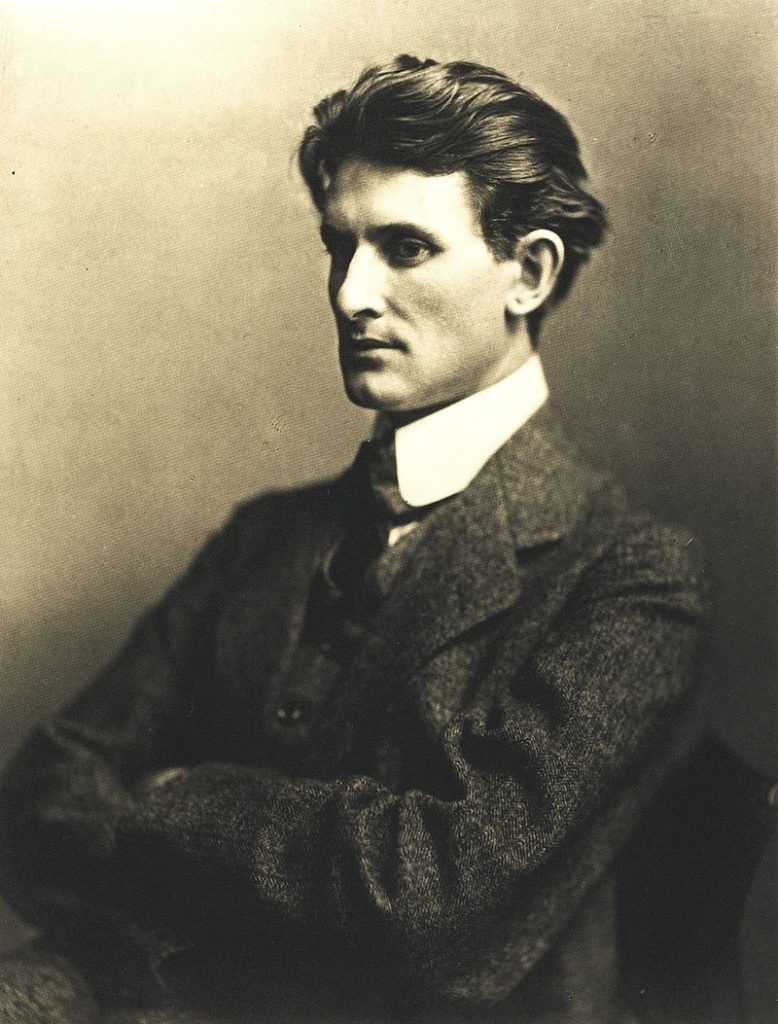
The library of poet and professor Friedrich Gundolf (1880-1931) reveals valuable insights into his scholarly and literary influence. Together with his wife, economist Elisabeth Salomon Gundolf (1893-1958), he shared a personal and professional life uncommon in its contemporary social and literary impact, and shaped in its turn by their turbulent times. The Gundolf collection in the Senate House Library today exhibits a broader range of the intellectual network in which both Gundolfs lived and worked.
As Michael Thimann recounts in his bibliobiography, Cäsars Schatten: Die Bibliothek von Friedrich Gundolf—Rekonstruktion und Wissenschaftsgeschichte [Caesar’s Shadows: A Reconstruction and Scholarly History of the Library of Friedrich Gundolf], Gundolf’s library was created from his scholarship, bibliophilia, and antiquarian passion. With pride, pleasure, and sometimes seeming guilt for extravagance, Gundolf would report his latest acquisition in an unlikely city or bookseller’s store in letters to friends and fellow authors. Thimann’s scholarship focuses on the resources, in Latin and in German, that helped Gundolf construct his seminal book Shakespeare und der deutsche Geist [Shakespeare and the German Spirit].
As a scholar of Shakespeare in the German language, Gundolf impacted a generation of readers and intellectuals by relating the influence of the English playwright on German culture in an era that saw the end of London’s formal involvement in the Hanseatic League. His scholarship could have been supported with 18th-century editions of Shakespearean plays by Johann Joachim Eschenburg and August Wilhelm Schlegel, as well as Friedrich Martin von Bodenstedt’s collection of Shakespearean sonnets. Of his contemporaries writing in the early 20th century, Gundolf owned Robert Hessen’s 1904 biography Leben Shakespeares [Life of Shakespeare], Levin Ludwig Schücking’s 1908 literary-critical monograph, published in Heidelberg, Shakespeare im literarischen Urteil seiner Zeit [Literary Opinions of Shakespeare in his Time], and Johannes Meissner’s 1914 Jung-Shakespeare [Young Shakespeare], published in Vienna.
Gundolf’s writings on and translation of Shakespeare, as well as his writing on Caesar, the Latin-language poets, and the poets and writers of antiquity, may well have informed his own creative practice. As Philipp Redl details in Dichtergermanisten Der Moderne: Ernst Stadler, Friedrich Gundolf Und Philipp Witkop Zwischen Poesie Und Wissenschaft [Germanist Poets of Modernism: Ernst Stadler, Friedrich Gundolf and Philipp Witkop between Poetry and Scholarship] the tension Gundolf felt mediating between his early poetic talent and acclaim as one of Stefan George’s intimates, and the maturation of his scholarly vocation did not fully dissipate. The historical and contemporary German-language poetry that also forms Gundolf’s sphere of influence appear in his library, such as a 1698 edition of Andreas Gryphius’ poems, and an edition of poetry and translations by Christian Hofmann von Hofmannswaldau from the 1680s, both published by the Fellgiebel family press in what is now Wroclaw (then Breslau). Generations of poets, from Friedrich Canitz through Anna Louisa Karsch and Albrecht von Haller to Adolf Glassbrenner, exemplify an array of 16th- and 17th-century German-language literature here, as well as translations across genres into German, including 16th-century translations of Petrarch by Stephan Vigilius, of Homer by Simon Schaidenraisser, and of Livy by Bernhardus Schöfferlin, Juo Wittig von Ham-melburg, Nicolaus Carbachius, and Jacobus Micyllus.
Elisabeth Gundolf oversaw the removal of her husband’s library to England after his death and her subsequent exile from Germany to Oxford. Her advocacy of his legacy also resulted in the publication of a translation of his edition of Hölderlin’s Der Archipelagus [The Archipelago] in London and then his biography of Frank Wedekind, both of which appear in the Senate House collection. The survival of the remaining collection is due to her attention and effort, as is its safekeeping at the University of London’s Senate House Library through bequest in 1961.
Jillian Saucier, Boston University
‘Encounters’: Katja Petrowskaja and Shelley Frisch – A Meeting of Minds
Margaret May reviews this fascinating ‘Encounters’ evening:
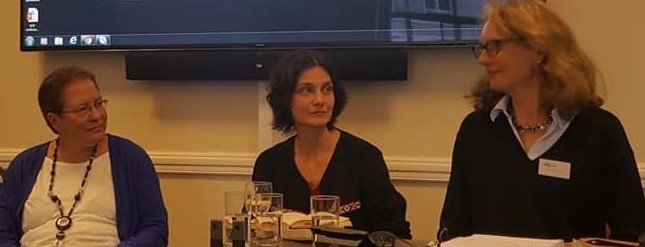
An enthusiastic audience of translators, scholars of translingual writing and lovers of good literature enjoyed a rewarding encounter at the IMLR on Thursday 30 May between Katja Petrowskaja, Ukrainian-born award-winning author of the genre-defying Vielleicht Esther (‘Maybe Esther’), and her acclaimed New York-based translator into English, Shelley Frisch. This event, convened and chaired by Godela Weiss-Sussex, took place appropriately in the context of a conference entitled ‘Across Languages: Translingualism in Contemporary Women’s Writing’.
I was particularly excited by this opportunity to meet and hear Katja Petrowskaja since I had chosen to explore an aspect of her work as part of my MRes dissertation and knew from various interviews I had read that we could expect a stimulating discussion. The encounter between author and translator followed the by now well-established format of this series – consecutive readings of passages from the book in each language while the other language was displayed on a screen – but this was only the framework. Right from the start it was clear that the author, who writes in a language she only learned as an adult, was keen to explore, explain and expound on the difficulties presented by various words and concepts – including the question of what kind of work we were dealing with. And Shelley Frisch, who has taught and written extensively on translation issues, was equally engaging in clarifying the challenges thrown up by this particular text. This encounter was truly a memorable meeting of minds.
In German, Petrowskaja’s Vielleicht Esther is subtitled ‘Geschichten’ (which can mean both ‘Stories’ and ‘Histories’), whereas the English translation dispenses with the subtitle altogether. Here the book is usually regarded as a memoir disguised as a novel (which gave rise to interesting questions about differences in the market for translated literature). It is a series of loosely connected episodes resulting from Petrowskaja’s real and metaphorical journey in search of her partly Jewish roots across Europe – a journey exploring language and muteness, imagined and created identity, fiction and documented history. The great-grandmother of the title, who may or may not have been called Esther, stands for the unreliability of memory and family myths. Petrowskaja herself rejected any ‘concept’ to define the book, calling it rather a ‘stumbling over history’, an intuitive search, an attempt to counter not only ideology but the resistance of material reality, and – perhaps surprisingly, given her background – to restore the ‘innocence of the German language’, while trying to avoid the ‘minefields’ of both this and her first language, Russian.
Despite the title, there is nothing provisional or uncertain about Petrowskaja’s linguistic precision. Throughout the event there was repeated emphasis on the associative power of words, sounds and structures – within and across languages – and consequently on the importance of listening to language, on hearing the power of language to conduct the writer (and reader) in part through serendipitous similarities, such as the untranslatable pun ‘Wer gehört wird, gehört dazu’ (‘To be heard is to belong’).
The rhythmic, musical quality of this work had clearly attracted Shelley Frisch too – she has referred to herself as an acoustic translator, interested in exciting words that resonate and in the way metaphors change between languages. This was reflected in her translational decisions – among those singled out by Godela was her change from an image of place to one of time, in translating Petrowskaja’s pun on ‘Wort’ and ‘Ort’ (‘word’ and ‘place’) to ‘phrase’ and ‘phase’ to preserve the assonance. This occurs in one of several remarkable – and remarkably narrated – dreams, recounted in a breathless stream of unconscious associations, with no capital letters or full stops: words that morph through auditory connections: ‘scheu, schau, schoah’ (‘shy, show, shoah’). Another example was the way Frisch dealt with the connotations of the name ‘Stern’ – problematic in German Jewish history.
Neologisms (or perhaps translingual words) abound in this work: in a key passage, a fixation on the putative role of a (possibly) fictive ficus plant in the story of the family’s flight from Kiev during the war gives rise to the concept of being ‘fikussiert’ or ‘ficusated’. Typically for Petrowskaja, the punning wordplay (a term she rather objected to because of its implication of mere playfulness) had a serious purpose: a meditation upon the decisive role of fiction in family history.
In another exchange, she explained that her use of the term Familienbaum instead of the more normal Stammbaum for family tree related to her sense that the latter suggested solidity and rootedness, which were inappropriate for her circumstances – and from there the discussion moved seamlessly to the different resonances of the Tannenbaum or Christmas tree in Ukrainian, Soviet Russian, English and German culture.
Indeed, one of the recurring themes of the event, pursued further in the Q&A session, was how the author navigated the problem of German not being her native language – something she has described elsewhere as a ‘slightly disturbed, non-functional aspect’ or a ‘delirium between languages’. She explained how help from native speakers was supplemented by sensitive editing that retained the ‘strangeness’ and sense of wonder in her language that is so apparent in the book. And in Shelley Frisch, Petrowskaja has found a thoughtful and understanding translator. For instance, in recalling her eleven-year-old self, she imaginatively associates the word ‘elf’ with the magical ‘Elfe’ of childhood – which Frisch translates as ‘the elfin age of eleven’. It was clear from their exchanges that this relationship between author and translator was one of especial empathy.
For those of us, in particular, for whom our mother tongue is not in fact our mother’s tongue, this was a thought-provoking event, challenging us to reconsider our belief that we ‘know’ our own, familiar language. It showed how language can shape identity and suggested ways of exploring the ‘Zwischenraum’ or space between languages, as well as providing insights into the benefits gained from a creative and collaborative approach to literary translation (something that can clearly be related to authors like Yoko Tawada who featured in the conference presentations).
If you haven’t yet read the book (whether in the original or in one of its dozens of other translations), then – with intriguing section titles ranging from ‘Thank Google’ and ‘Facebook 1940’ to ‘Goethe’s Secret Service’ and ‘Lunch Break in Mauthausen’ – you have a treat in store!
Margaret May, MRes graduate, IMLR
Migrants, refugees, exiles, and literary fiction. A round table discussion at MALBA Museum Buenos Aires
Katia Pizzi discusses a recent meeting held in Agentina:
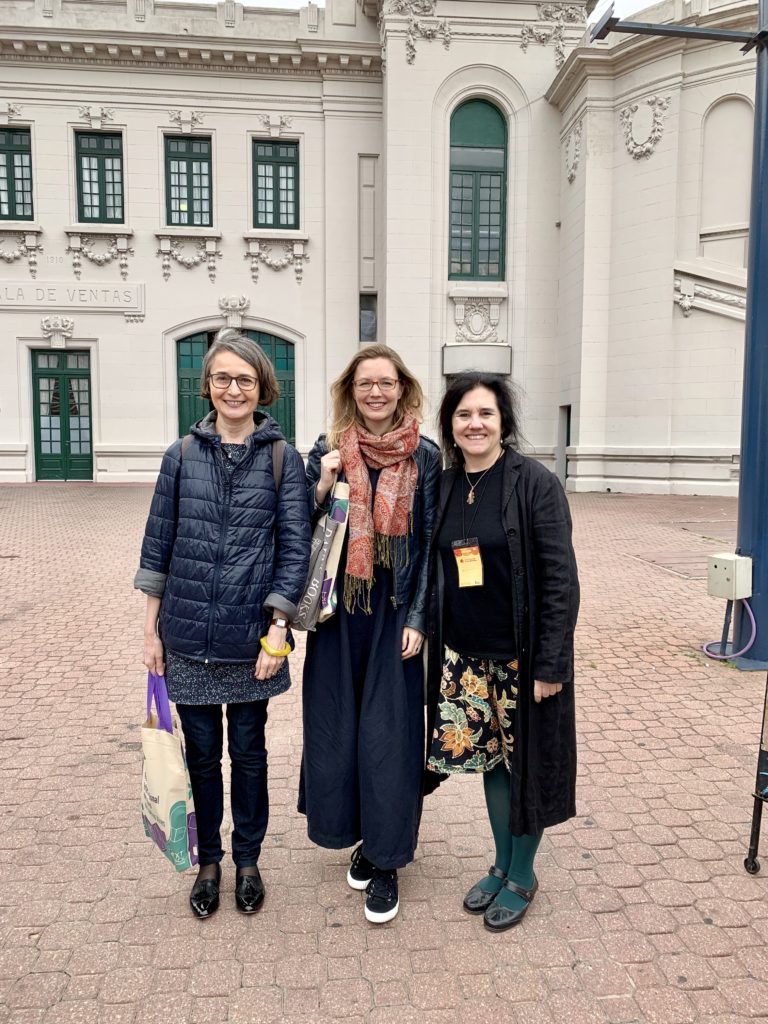
In 2001, the Argentinian government approved a Law granting the title of ‘site of memory’ to sites that operated as clandestine detention centres prior to 1983. Memories of disappearance, genocide and displacement of people in Latin America and the world over sparked off a rich discussion before a large audience on the evening of 22 April at the Library of MALBA (Museo de Arte Latino Americano de Buenos Aires). This meeting was part of a week-long series of activities organised by the Autumn Translation School in Buenos Aires (21-28 April 2019; project Literary Translation Workshops: Bridging Communities led by Cecilia Rossi of the British Centre for Literary Translation at the University of East Anglia) funded by the AHRC OWRI project ‘Cross-Language Dynamics: Reshaping Community (CLDRC)’.
Mónica Szurmuk chaired the meeting. Katia Pizzi (Institute of Modern Languages Research, School of Advanced Study, University of London) kicked off the evening. ‘Languages’, she said, ‘are instruments of communication. Languages, however, can also be instruments of exclusion. Our languages and our bodies help us make sense of the world but it is memory that gives the world meaning.’ Pizzi proceeded to present a pertinent case study: in the cultural and literary region at the northeastern borders of Italy memories are historically divided and ‘fractured’ (Foot 2009) along national, social and ethnic lines. Here, dialogical and ‘translational’ practices (Gramsci 1971) are ‘difficult, if not outright impossible’ (Pizzi 2013).
Creative authors Gianna Molinari (Switzerland), Cynthia Rimsky (Chile) and Katherine J. Orr (United Kingdom) addressed salient themes, e.g. silences tripping up the construction of memorial narratives; gaps of memory and identity and constructions of memory of the ‘desaparecidos’ through conscious and unconscious practices (see Orr’s monologue ‘Disappearances’, winner of the BBC Short Story prize 2016). Molinari rounded up the discussion introducing the audience to the protagonist of her novel Hier ist noch alles mőglich (winner of the Robert Walser prize 2018). A man ‘fallen from the sky’, he epitomises all refugees without papers, without a name, without an identity.
Katia Pizzi, Senior Lecturer Italian Studies (IMLR/London) & Director, Centre for the Study of Cultural Memory
When Poets become Heroes. Alexander Pope and the German Authors of the mid-18th Century
Robert Leucht, former Sylvia Naish Fellow, provides some insights into the research project he pursued at the IMLR.
A crisis of orientation
The years around 1750 represented a crisis of orientation for German authors.
Around this time, at least three different types of author co-existed: first, the court bard (Hofpoet), who produced literary texts on occasion, for noble patrons; second, the scholarly poet (Gelehrtendichter), who was active as a writer, but also as a teacher; and third, the independent writer (freier Schriftsteller), as experimented with by Friedrich Gottlieb Klopstock, Christoph Martin Wieland and others. This last, however, had at that time not yet fully emerged.
German authors of the time had a choice between a rock and a hard place: between artistic bondage on the one hand and economic uncertainty on the other.
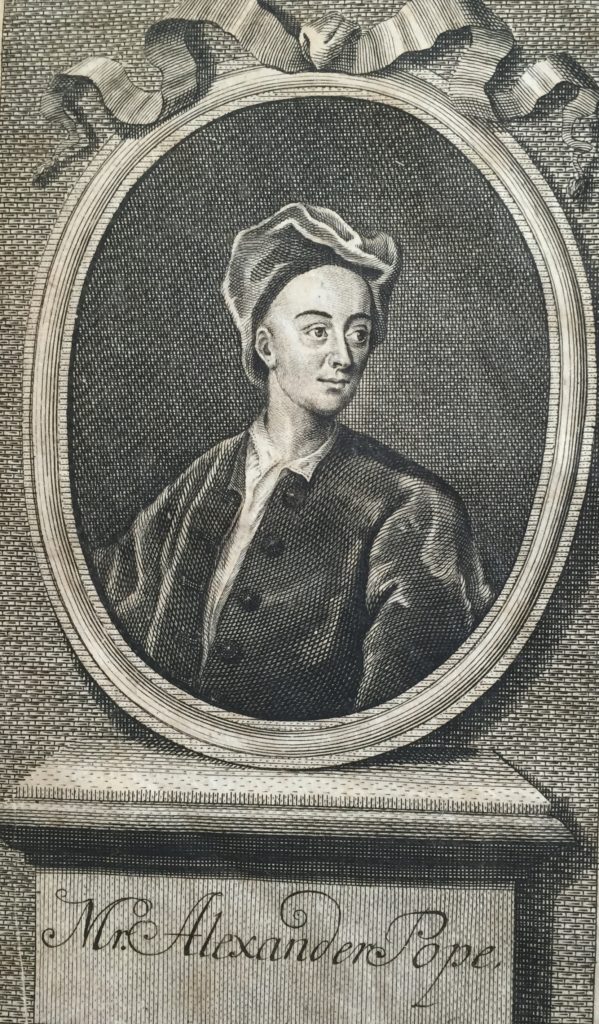
Seeking orientation in England
At this critical moment, some of them sought orientation abroad, particularly in England and France, where a literary public was already further developed, and, more importantly, authors such as Voltaire and Alexander Pope seemed to enjoy much greater freedom, artistically and economically. Of all European writers it was Pope who played the most prominent role for German authors of the time. Indeed, for some of them, including Klopstock, Lessing and Wieland, he represented the ideal of an independent writer and served as a role model.
Creating the demonstrative biography of an independent writer
“Ich komme auf Herrn Popen selbst. Dieser hält sich gemeinglich zu Twittenham, die angenehmste Graffschaft in der Gegend Middelsex, 12 Meilen von London, auf. Der Mylord, Peterborough, hat ihm allda ein prächtiges, nahe an der Temse gelegenes Haus aus bloßer Hochachtung vor seine besonderen Verdienste, verehret. Er hat dabei einen Garten mit mäßigen Kosten angeleget, den alle Kenner bewundern, und weit kostbareren Gärten vorziehn, welche mehr den Reichthum, als den guten Geschmack ihrer Besitzer oder Eigener bezeugen. Die Grossen am Englischen Hofe haben keine Mittel gefunden, ein Herz oder eine Feder, wie die seinigen, zu gewinnen. Die Freyheit zu gedenken, hat er allem Eigennutze der Ehrbegierde oder der Habsucht vorgezogen, weil er alles in seinem Eigenthum, in sich selbst, in seinen Büchern, und in der Freundschaft und dem Umgang weniger Bekannten findet, was ihm schätzbar scheinet. Mit Höhern, schreibt Herr William Delland lebt er ohne Schmeicheley und Niederträchtigkeit, und er dienet ihnen ohne Eigennutz und Vortheil.” 1
This passage stems from an introduction to an early translation of Pope’s Essay on Man (1740), which represents probably the first biographical sketch of the English poet in the German-speaking world. Representative of many of the biographical sketches to come, in this source Pope is depicted in his relation to money, on the one hand, and to power, on the other – as a poet both economically independent and untrammelled by court protocol.
Such depictions are not of biographical use since their claim to provide us with a realistic image of Pope’s life is belied by the fact that Pope actually suffered from his dependency, not on the aristocracy, but rather on the newly emerging literary market. They are nonetheless relevant as manifestos, in which poets striving to emancipate themselves from the aristocracy created an idealized, not yet existent image of a writer. They constitute the demonstrative biography of a freier Schriftsteller, which provided authors on the verge of the status of freier Schriftsteller with a sense of where they needed to go.
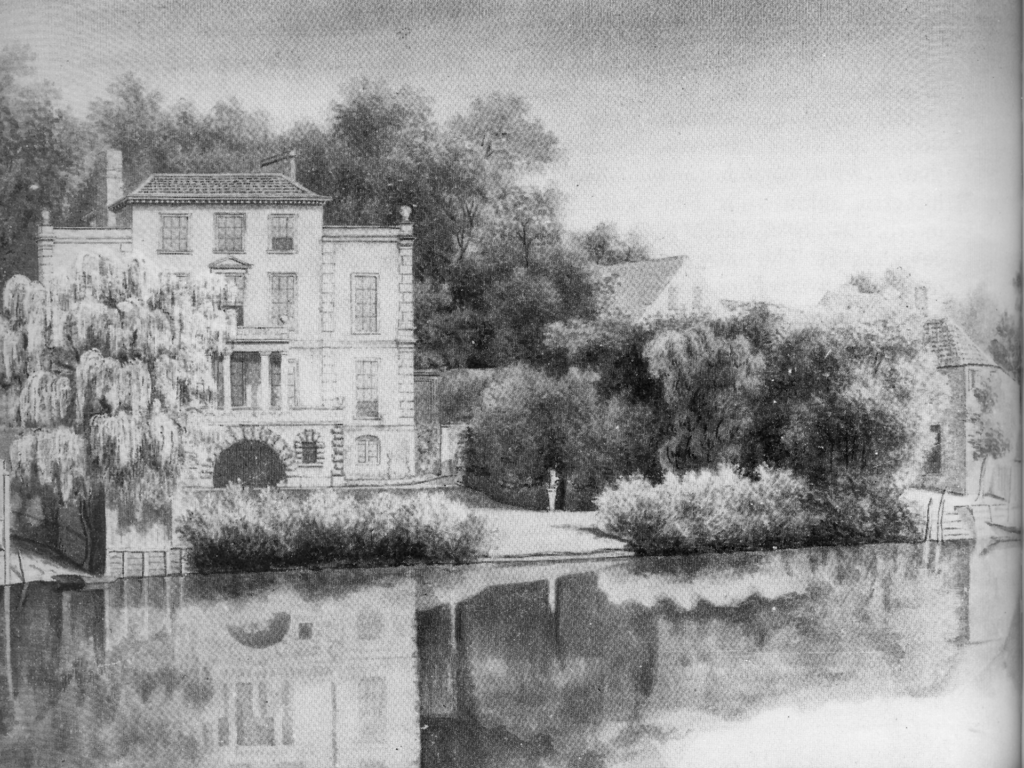
The poet’s garden
In the creation of Pope’s legend as the ideal of an independent writer, his property in the southwest of London, his Twickenham garden, is among the recurring elements.
Remarkably, the description of Twickenham is juxtaposed with that of Pope’s works: characteristics such as originality, or taste, attributed to Pope’s work, are attributed also to the poet’s garden. In other words, the description of Pope’s garden mirrors the image created of Pope, the author, as showing ‘good taste’ and avoiding any ‘exuberance’.
This very juxtaposition provided an overreaching illusion of Pope’s life.
The effective powers of this life illusion may be inferred from the fact that, after the poet had died in 1744, German authors would go on pilgrimages to Twickenham, where some visitors would take pieces of Pope’s estate with them as souvenirs. Sophie La Roche, for example, in a letter to Wieland, confesses that she has picked a leaf from Pope’s garden.
More than a case study
The vicissitudes of Pope’s biographical legend in Germany can be seen as an episode in the long history of entanglements between German and English literature.
But the story also raises questions of a more general importance; questions, I believe, more relevant today than ever:
How do collectives create phantasms of individual greatness?
In what historical contexts can these phantasms evolve?
How do these phantasms provide orientation among disorientation?
The biographical legend created around Pope in the mid-18th century in Germany, which I have been researching at the IMLR, must be seen as a more general mechanism of role-model construction: the creation of great men, or heroes, if you wish.
1. Barthold Joachim Zinck: „Vorbericht“. In: Barthold Joachim Zinck (Hg.): B. H. Brockes. Aus dem Englischen übersetzter Versuch vom Menschen des Herrn Alexander Pope nebst verschiedenen anderen Übersetzungen und einigen Gedichten. Hamburg 1740, S. 4–27, Zitat S. 19–21.
Robert Leucht, Sylvia Naish Fellow (Jan-Feb 2019)
